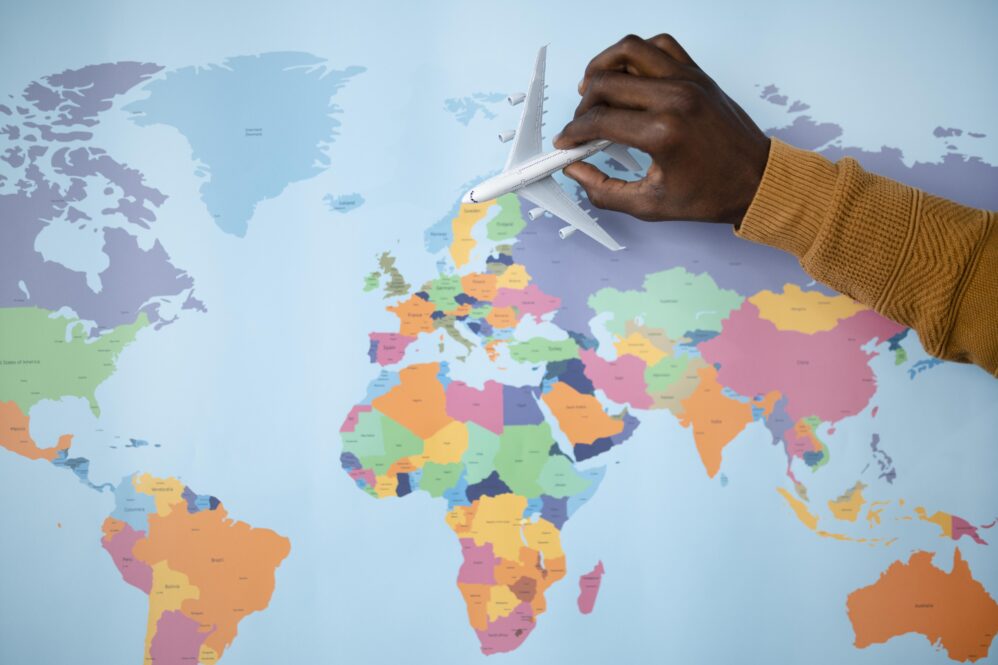In today’s interconnected and globalized world, foreign affairs and international relations play a pivotal role in shaping a country’s economic landscape. For Nigeria, a nation endowed with vast human and natural resources, leveraging its diplomatic efforts can present numerous opportunities to bolster its economy. As of [current date], Nigeria stands at a critical juncture in its economic trajectory, seeking ways to achieve sustained growth and development. By strategically harnessing the potential of foreign affairs, Nigeria can unlock new avenues for economic prosperity and global engagement.
This article aims to explore how foreign affairs can become a catalyst for economic growth in Nigeria. From attracting Foreign Direct Investment (FDI) to promoting exports and embracing technology transfer, there are several key areas where diplomatic efforts can create a positive impact.
Attracting Foreign Direct Investment (FDI)
Foreign Direct Investment (FDI) plays a crucial role in boosting the economy of Nigeria. As one of the most populous and resource-rich countries in Africa, Nigeria has immense potential to attract foreign investors and leverage their expertise and capital for sustainable economic growth. In this section, we will explore how foreign affairs can be harnessed to attract more FDI into Nigeria.
The Importance of FDI for Economic Growth
Foreign Direct Investment is an essential driver of economic development for any country. When foreign companies invest in Nigeria, they bring in capital, advanced technology, management expertise, and access to international markets. This influx of resources contributes to the growth of domestic industries, creation of jobs, and an overall increase in productivity and efficiency.
Nigeria’s Potential as an Attractive Investment Destination
Nigeria possesses a wealth of natural resources, including oil, gas, minerals, and agricultural products. Additionally, the country boasts a large and youthful population, which presents a significant consumer market. These factors, combined with ongoing efforts to improve the business environment, make Nigeria an attractive destination for foreign investors seeking new opportunities.
The Role of Foreign Affairs in Promoting Nigeria to Foreign Investors
To fully harness the potential of FDI, Nigeria’s foreign affairs strategy must actively promote the country to potential foreign investors. Here are some key ways in which foreign affairs can play a vital role:
1. Strengthening Diplomatic Ties with Key Countries and Economic Blocs:
Cultivating strong diplomatic relationships with influential countries and regional blocs can foster trust and confidence in Nigeria as a stable and reliable investment destination. Regular high-level diplomatic engagements can facilitate dialogues on investment opportunities and address concerns that potential investors may have.
2. Hosting Investment Forums and Trade Missions:
Organizing investment forums and trade missions in collaboration with foreign governments and business associations can showcase Nigeria’s potential to a broader audience of investors. These events provide a platform for Nigerian businesses to interact directly with international investors, fostering valuable partnerships.
3. Improving the Ease of Doing Business and Regulatory Environment:
Foreign investors are more likely to invest in a country with a transparent and favorable business environment. Nigeria’s foreign affairs policymakers can work closely with relevant domestic agencies to streamline regulations, reduce bureaucratic hurdles, and ensure a conducive climate for foreign investments.
By effectively utilizing foreign affairs as a tool for attracting FDI, Nigeria can unlock new opportunities for economic growth and development. It is crucial for policymakers to proactively engage with the international community, present Nigeria’s potential, and address concerns to build lasting partnerships that benefit both foreign investors and the Nigerian economy.
Enhancing Export Opportunities
Nigeria’s economy has immense potential, and one key strategy to unleash its growth is by enhancing export opportunities. Exporting goods and services to other countries not only expands markets for Nigerian businesses but also strengthens the nation’s economic foundation. Through effective foreign affairs and international relations, Nigeria can open doors to new markets, diversify its exports, and boost its overall economic prosperity.
Analyzing Nigeria’s Current Export Profile and Challenges
Before delving into how foreign affairs can bolster exports, it’s essential to understand Nigeria’s current export landscape and the challenges it faces. Historically, Nigeria has heavily relied on oil exports, which have been susceptible to price fluctuations in the global market. This over-reliance on oil has made the economy vulnerable to external shocks, hindering its ability to achieve sustainable and diversified growth.
Furthermore, logistical constraints, infrastructural deficiencies, and bureaucratic hurdles have hampered the competitiveness of non-oil exports. To unlock the full potential of Nigerian products and services in the international arena, these obstacles must be addressed.
How Foreign Affairs Can Help Diversify and Expand Export Markets

Foreign affairs play a pivotal role in opening up new avenues for Nigerian exporters. By forging stronger diplomatic ties and engaging in strategic international relations, Nigeria can create an enabling environment for its businesses to flourish globally. Here are some ways in which foreign affairs can positively impact export opportunities:
1. Negotiating Trade Agreements with Other Nations:
Establishing bilateral or multilateral trade agreements can reduce trade barriers and facilitate the movement of goods and services across borders. By working collaboratively with other countries, Nigeria can gain preferential access to foreign markets and attract investors looking to tap into Nigeria’s potential.
2. Participating Actively in Regional and Global Trade Organizations:
Active participation in organizations like the African Continental Free Trade Area (AfCFTA) can open doors to a massive market of over a billion people, promoting intra-African trade. Additionally, engaging with global trade bodies like the World Trade Organization (WTO) helps Nigeria stay abreast of international trade rules and regulations.
3. Leveraging Diplomatic Channels to Address Trade Barriers and Disputes:
Foreign affairs can serve as a powerful tool in resolving trade disputes and addressing non-tariff barriers that hinder Nigerian exports. Engaging in diplomatic dialogues with trading partners can lead to mutually beneficial solutions and foster stronger economic ties.
Nigeria’s vast agricultural resources, manufacturing capabilities, and a burgeoning technology sector offer an array of export opportunities. Through foreign affairs strategies that prioritize trade diversification and market expansion, Nigerian businesses can gain access to new and lucrative markets, reducing dependency on oil and enhancing the nation’s economic resilience.
Technology and Knowledge Transfer
In today’s interconnected world, technology and knowledge transfer plays a crucial role in driving economic growth and development for nations. For Nigeria, embracing foreign affairs as a means to facilitate these transfers can unlock untapped potential and propel the nation to new heights. In this section, we’ll delve into how technology and knowledge exchange through foreign affairs can benefit Nigeria’s economy.
Embracing Technology and Knowledge Transfer
In an era dominated by innovation and digitalization, keeping up with the latest advancements is paramount for economic success. Technology and knowledge transfer refer to the process of sharing expertise, skills, and ideas across borders. By embracing this concept, Nigeria can leapfrog developmental stages and gain access to cutting-edge solutions that address its unique challenges.
The Role of Foreign Affairs
Foreign affairs, which encompasses diplomacy, international relations, and cooperation, offers Nigeria a gateway to accessing global knowledge networks. Here’s how it can play a pivotal role in fostering technology and knowledge transfer:
1. Establishing Educational and Research Partnerships:
Collaborating with foreign universities and research institutions opens up opportunities for Nigerian students and scholars to gain exposure to diverse academic environments. This promotes the exchange of ideas and expertise, contributing to advancements in various fields.
2. Encouraging Foreign Companies’ R&D Investment:
Through diplomatic efforts, Nigeria can attract foreign companies to set up research and development centers within its borders. This move not only brings in much-needed investments but also facilitates the transfer of technology and expertise to local talent.
3. Promoting Collaborations in Science and Technology:
Engaging in bilateral or multilateral agreements with other nations for joint research projects and technology initiatives can lead to mutually beneficial outcomes. These collaborations enable Nigeria to learn from global leaders and contribute its expertise to solve shared challenges.
Benefits of Technology and Knowledge Transfer
The advantages of technology and knowledge transfer are extensive, offering a multitude of benefits for Nigeria’s economy:
1. Accelerated Industrialization:
Embracing advanced technologies can streamline industrial processes, boost productivity, and foster the growth of new industries. This, in turn, creates employment opportunities and enhances economic output.
2. Enhanced Healthcare and Agriculture Sectors:
Access to cutting-edge medical advancements and modern agricultural practices can lead to improved healthcare outcomes and increased agricultural yields. This contributes to a healthier population and better food security.
3. Fostering Innovation and Entrepreneurship:
Exposure to global ideas and best practices can inspire local entrepreneurs to innovate and develop solutions tailored to Nigeria’s needs. This nurtures a thriving startup ecosystem and contributes to economic diversification.
4. Global Competitiveness:
By harnessing foreign knowledge and technologies, Nigeria can strengthen its position on the global stage, making it a more attractive destination for foreign investment and trade partnerships.
Challenges and Mitigation
While the prospects of technology and knowledge transfer are promising, certain challenges must be addressed:
1. Infrastructure Development:
Robust infrastructure is essential to support the integration of advanced technologies. Nigeria must invest in reliable power supply, internet connectivity, and transportation networks to fully leverage technology transfers.
2. Intellectual Property Protection:
Strengthening intellectual property laws and enforcement is crucial to encourage foreign companies to share their proprietary knowledge without fear of misappropriation.
3. Skills and Capacity Building:
To fully benefit from technology and knowledge transfers, Nigeria must focus on developing the skills and expertise of its workforce. Education and vocational training programs must align with emerging technological trends.
Conclusion
By cultivating strong relationships with the international community, Nigeria can position itself as an attractive and reliable partner for investment, trade, and knowledge exchange. With a concerted effort to leverage foreign affairs for economic development, Nigeria can unlock its true potential, uplifting its citizens, and contributing to the overall prosperity of the nation.
Let us remain optimistic about Nigeria’s future, knowing that well-executed foreign affairs can play a pivotal role in shaping a brighter and more prosperous tomorrow for this vibrant African nation. As citizens and stakeholders, let us support and encourage policies that strengthen Nigeria’s position on the global stage and lead to a more robust and thriving economy. Together, we can build a better, more interconnected, and economically dynamic Nigeria for generations to come.











